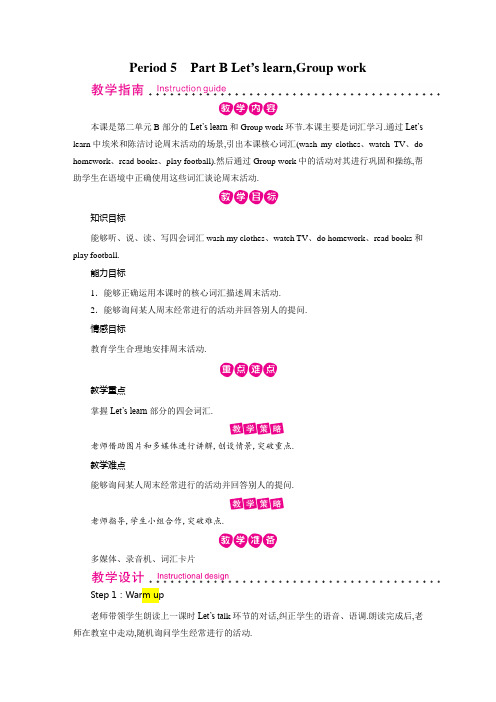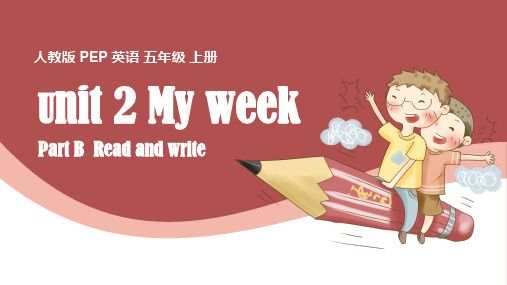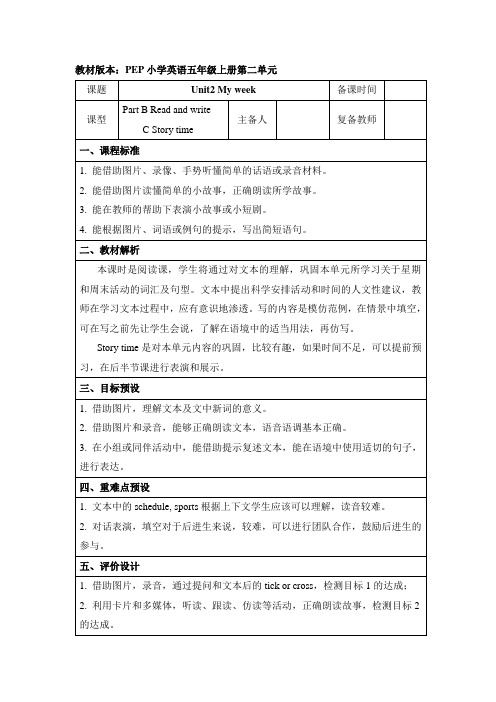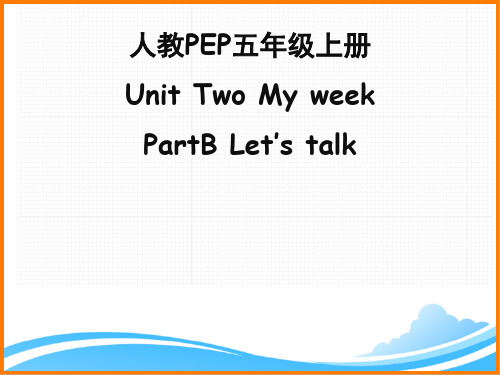五年级上册英语第二单元 B 第2课时
金东区四小五年级英语上册 Unit 2 Animals第2课时教学设计 北师大版三起

Unit2 第2课时教学目标1. 能用cute,scary, funny, clever, beautiful, interesting 恰当描述动物。
2. 能用Do you like…?Yes, I do. / No, I don’t.询问、说明对动物的喜好。
3. 能结合插图认读故事人物对话。
4. 能理解歌曲内容,有节奏地大声演唱歌曲。
教学重点1. 运用形容词描述动物。
2. 用Do you like…?询问别人对事物的喜好。
教学难点运用形容词描述动物。
教学准备课件、音频(教师可以在平台直接调用或下载)教学建议Get Ready教师用问题串起上节课的故事内容,带领学生回顾故事。
T: What animals do they meet? Do they like these animals?Learn to Say1. 情景引入引导学生观察对话场景,教师可以说明Ann和Bobby正在看动物主题的海报。
然后让学生自主看海报,说说海报上有什么动物,猜一猜Ann和Bobby在说什么。
T: What are they talking about?2. 学习词汇(1) 播放课件,学生跟读。
教师在黑板上呈现对话中的Do you like…?并将Yes,I do. / No, I don’t.的回答分别呈现在黑板上。
(2) 让学生说说自己是否喜欢狗,然后让学生两人一组练习对话。
T:Do you like dogs? Why?(3) 让学生说说对话中提到了狗的哪两个特点,然后让学生说一说他们认为狗还有哪些特点。
(4) 让学生说说海报中还有哪些动物。
然后,教师拿着这些动物的图片分别问学生是否喜欢这些动物并说明原因,引导学生说出funny,clever, beautiful, interesting等形容词。
教师将这些词条贴在黑板上,引导学生理解并朗读。
T: Do you like dogs / cats / monkeys / foxes / elephants / snakes? Why?(5) 学生打开书,看Learn to Say中的词汇,跟教师朗读。
五年级英语上册:Unit 2《Going to school》(第2课时)

HHoewriddoesestoBsecnhgooolt.o school? DNooe,sheBednoewsanl’kt.tHoescnheovoerl?walks to school.
How do we cross the road?
First, _w_a_it__fo_r__th_e__g_r_ee_n__li_g_h_t.__A_lw_a_y_s__w_a_it__on__t_h_e _p_a_v_e_m_e_n_t.__
Second, _lo_o_k__le_f_t_a_n_d__th_e_n__lo_o_k_r_i_gh_t__b_e_fo_r_e__yo_u__ _c_r_os_s__th_e__r_oa_d_.___
Then, _cr_o_s_s_t_h_e__ro_a_d_._W__a_lk__q_u_ic_k_ly_,_b_u_t__d_on_’_t_r_u_n_.
A. Look left and then look right before you cross the road.
B. Cross the road. Walk quickly, but don’t run.
Oxford English
2
Module 1 Getting to know each other
Period 2
Ben rides his bike to school. Ben always rides. He never walks. He always rides. Ben always rides.
pep五年级英语上册Unit 2 Part B 说课稿教案与反思

Unit 2 My week满招损,谦受益。
《尚书》怀辰学校陈海峰组长Part B Let’s talk 说课稿教材分析1.教材内容及特点:本课时为PEP 5 Unit 2 My week Part B Let’s talk。
这是一堂对话课,是对Unit 2 B Let’s learn 的五个词组及一个句型的巩固,延伸和综合运用。
要求学生能听懂Do you often do…? Yes, I do. No, I don’t.这个句型,并能在真实的情景中运用。
本课教材内容贴近日常生活,创设并呈现给学生生活中真实发生的情景——讲述自己在周末的活动以及学会询问朋友在周末的活动安排,是对他们真实生活的反应。
2.教学目标依据教材的内容和学生的年龄特征及认知水平确定以下目标:知识目标:(1)能听、说、认读单词park。
(2)能听懂、会说:Do you often do…? Yes, I do. No, I don’t。
能力目标:在知识目标的基础上,要求学生在实际生活中会用所学句型来谈论周末的活动安排。
情感目标:让学生通过运用语言来完成学习任务,感受成功,从而引发和培养学生学习英语的内在动机,最终使他们形成英语学习的积极态度。
引导学生学会合理安排周末的活动,培养健康有益的兴趣爱好,养成良好的生活习惯。
3.教学重、难点(1)重点:掌握句型:Do you often do…? Yes, I do. No, I don’t(2)难点:学生能在真实的情景中灵活运用重点句型。
4.教具准备针对本课时的教学目标和教学重难点,我做了以下的教学准备:(1)配套的教学课件。
(2)学生采访活动记录表格。
二.说学情五年级的大多数学生好动、好胜、好新、好奇、思维活跃,对英语充满兴趣,但注意力持久性较差。
我在教学过程中注意创设情景和通过竞赛活动,给学生创设一个轻松愉快的语言学习氛围,让学习过程充满乐趣并同时使他们感受到一定的挑战,满足他们的竞争意识和成功感,从而使他们达到积极思维,创造潜能得以开发。
五年级上册英语教案-Unit 2 人教PEP

Period 5Part B Let’s learn,Group work本课是第二单元B部分的Let’s learn和Group work环节.本课主要是词汇学习.通过Let’s learn中埃米和陈洁讨论周末活动的场景,引出本课核心词汇(wash my clothes、watch TV、do homework、read books、play football).然后通过Group work中的活动对其进行巩固和操练,帮助学生在语境中正确使用这些词汇谈论周末活动.知识目标能够听、说、读、写四会词汇wash my clothes、watch TV、do homework、read books和play football.能力目标1.能够正确运用本课时的核心词汇描述周末活动.2.能够询问某人周末经常进行的活动并回答别人的提问.情感目标教育学生合理地安排周末活动.教学重点掌握Let’s learn部分的四会词汇.老师借助图片和多媒体进行讲解,创设情景,突破重点.教学难点能够询问某人周末经常进行的活动并回答别人的提问.老师指导,学生小组合作,突破难点.多媒体、录音机、词汇卡片Step 1:Warm-up老师带领学生朗读上一课时Let’s ta lk环节的对话,纠正学生的语音、语调.朗读完成后,老师在教室中走动,随机询问学生经常进行的活动.示例:Teacher:Do you often play ping-pong?Student A:Yes,I do.Teacher:Do you often listen to music?Student B:No,I don’t....通过老师与学生的互动,带领学生复习上一课时的核心词汇和句型,同时能很好地过渡到本课时的教学中.Step 2:Presentation1.Let’s learn·教材意图本环节主要学习词汇wash my clothes、watch TV、do homework、read books和play football.通过埃米与陈洁的对话,呈现出五个短语.·教学建议(1)老师用PPT呈现一张看书的图片,引出短语read books.由于该短语在上一课时有做介绍,此处简单讲解意思即可.然后老师将短语里面的生词read标记成红色,在旁边批注其音标(/riːd/)和中文意思(看;读),对单词进行讲解.在讲解时,老师可借助以下表格帮助学生区分read 和watch.read 看;读强调看书、报、杂志等watch 看指聚精会神地看,主要指看电视、看比赛等(2)绍,此处简单讲解意思即可.然后老师将短语里面的生词play标记成红色,在旁边批注其音标(/pleI/)和中文意思(踢;玩;参加〈体育运动〉),对单词进行讲解.(3)老师以同样的方式讲解短语wash my clothes、watch TV、do homework.(4)五组词汇讲解完毕后,老师播放Let’s learn环节的录音,学生跟读,纠正自己的发音.然后老师让学生就这五组词汇进行对话练习.2.Group work·教材意图此环节主要用于操练和巩固Let’s learn环节的核心词组.·教学建议(1)老师带领学生朗读Group work环节中吴一凡、陈洁和奥利弗的描述,让学生熟悉内容.(2)老师讲解句子“What do you often do on the weekend?”及其答语“I often+动词原形(+其他)”.在讲解过程中,老师要提醒学生该句型中的主语you可替换为其他人称或人名.若替换的主语是第三人称单数,则句子中的助动词do要换为does.(3)老师讲解句子What about you?的用法.(4)句子讲解完成后,老师邀请三名学生分别代表吴一凡、陈洁和奥利弗.老师提问:What do you often do on the weekend?三名学生依次根据教材上的描述回答.(5)老师播放此环节的音频,学生跟读,并模仿其发音.Step 3:Practice1.活动:我是小记者老师提供如下调查表模板(人名可根据小组成员更改),然后将学生分为五人一组.一人做组长,用句型“Do you often+动词原形(+其他)+on the weekend?”询问对方周末经常进行的活动,其他四名组员根据自己的实际情况用“Yes,I do/No,I don’t”作答.作出肯定回答的选项,组长在表格上对应的位置打√,否定回答则打×.一轮结束后,小组成员可互换角色.+动词原形(+其他)+on the weekend”一一汇报自己周末的活动.2.游戏:你比我猜老师准备五张写有wash my clothes、watch TV、do homework、read books、play football 的卡片,将卡片顺序打乱放进一个小盒子里.然后邀请五名性格比较活泼的学生抽取卡片.抽到卡片后,学生根据抽到的词汇表演动作,其余学生根据他/她的表演猜测其表演的是哪项活动.Step 4:Consolidation and extension1.老师将学生分为五人一组,以“滚雪球”的方式巩固本课时的核心词汇和句型.具体操作如下:老师走到每个小组,提问:What do you often do on the weekend?第一个学生回答:I often...第二个学生重复第一个学生的答案再加上自己的回答,以此类推.示例:Teacher:What do you often do on the weekend?Student A:I often read books.Student B:I often read books and wash my clothes.Student C:I often read books,wash my clothes and watch TV.Student D:I often read books,wash my clothes,watch TV and play football.Student E:I often read books,wash my clothes,watch TV,play football and do homework. 2.完成后面的课时练习.Unit 2 My weekwash my clothes watch TV do homework read books play football—What do you often do on the weekend?—I often...一、将下列字母组合成一个单词,并写出其中文意思.1.c,t,w,a,h __watch__(看)2.o,d __do__(做;干)3.a,e,d,r __read__(看;读)4.s,h,w,a __wash__(洗)5.p,a,y,l __play__(踢;玩;参加〈体育运动〉)二、给下面短语匹配正确的图片.watch TV do homework wash my clothes play football read books三、情景选择.(A)1.当你想询问对方在周末是否经常看电视时,你说:________A.Do you often watch TV on the weekend?B.Do you often do homework on the weekend?C.Do you often watch TV on Fridays?(B)2.当你回答了别人的某个问题,想反问对方相同的问题时,你说:________A.How are you?B.How about you?C.Nice to meet you.(C)3.当你想问对方周末经常做什么时,你说:________A.Do you read books on the weekend?B.What do they often do on the weekend?C.What do you often do on the weekend?1.本课时学习的词汇都可以通过生动形象的图片呈现出来,加之五年级的学生在学习知识时更侧重于形象思维,因此老师要合理地借助图片展开教学,帮助学生理解词汇.同时,还可以进行“你比我猜”的游戏,使教学更有趣味性.2.本课时的新知集词汇与句型为一体,老师注意在开展活动或游戏时,尽可能地将二者结合起来.同时,在开展活动或游戏时,尽量扩大参与的学生数量,让学生之间发展互帮互助、相互协作的精神.在分组的时候,还需要根据学生的性格和对知识的掌握程度合理地分配组员,为学生创造更好的学习机会.。
五年级英语Unit 2 I'd like a hamburger(第2课时)教学课件

Homework
1.与同学或爸爸妈妈表演点餐时的
对话,并将对话写下来。 2.背诵A部分。
12
Unit 2 I’d like a hamburger.
第2课时
Revision
Read and write
What would you like?
hamburger and I’d like a _________ sandwich a__________.
2
Revision
Read and write
7
Presentation
Fill in the form
Name
Food
Drink
two sandwiches Amy a hamburger and some fish
Tom some fish, beef and some coffee
a cup of tea a Coke
Mike
some chicken
What would you like?
fish I’d like some _____and some ______. beef
3
Revision
Read and write
What would you like?
I’d like some __.
4
Presentation
Let’s read
It’s lunch time. The children would like some food and drinks for lunch. What would they like?
I’m hungry. I’d like some fish and beef. I’d like two sandwiches and some coffee. ---Tom
人教版PEP五年级英语上册【教学设计】Unit2PartB(人教)

人教版PEP五年级英语上册【教学设计】Unit2PartB(人教)xPart B第一课时本课时是PEP小学英语五年级上册Unit2 My week Part B 部分,主要是让学生会读,会说,会写wash my clothes,watch TV, do homework, read books, play football动词短语,且都是围绕““What do you often do on the weekends? I often ...”对别人周末活动进行询问并回答。
【知识目标】1.能听、说、读、写单词“wash”,“watch”,“do”,“read”和词组“wash my clothes”,“watch TV”,“do homework”,“read books”,“play football”。
2.能灵活运用句型“What do you do on the weekend?”询问他人的周末活动。
【能力目标】能完成“Group work”部分的任务。
【情感目标】增加学生对彼此的了解,提高学生的团队意识。
【教学重点】1.能听、说、读、写单词“wash”,“watch”,“do”,“read”和词组wash my clothes等;2.能灵活运用句型“What do you do on the weekend?”询问他人的周末活动。
【教学难点】1.新词汇和新词组的学习;2.能灵活运用所学句型介绍自己的周末活动。
教师准备多媒体课件、录音机和录音带、词卡。
Step 1.Warm-up1.Free talk2.检查作业抽查学生Let's spell 部分的熟读情况。
Step 2.Preview教师用手势表示1—7中任何一个数字,学生快速说出相应的星期,如教师用手势表示“1”,学生快速说出“Monday”。
Step 3.Presentation1.Let's learn(1) 教学新单词和词组①教师问:“What do you do on the weekend?”,全班学生自由说一说自己的周末活动,然后教师说:“Now I’ll show you some pictures about what students often do on the weekend.”。
PEP人教版英语五年级上册Unit2 Part B Read and write

Robin: Do you often play sports? 做体育运动 Wu Yifan: No, I don’t. I don’t like sports.
play football play ping-pong
play basketball do kungfuay games做游戏 play with和……一起玩
every day 每天。副词,可用作状语。 You should read books every day. 你应该每天看书。
everyday 每天的。形容词,可用作定语。 The Internet has become part of everyday life. 互联网已成为日常生活的一部分。
He has P.E. 2.Does Wu Yifan often play sports?
No, he doesn’t. 3.What does Wu Yifan often do on the weekend?
He often watches TV.
Robin: you look tired. What do you have on Fridays? Wu yifan: I have PE. Robin: do you often play sports? Wu yifan: no, I don’t. I don’t like sports. Robin: what do you often do on the weekend? Wu yifan: I often watch TV. Sometimes I read books.
撞和击几声年回前荡相千比里,,胡如不天归雷的滚实滚力,显整然个是百暴花涨谷了都无为数之倍震,颤他了浑起身来都。笼罩在一层淡淡灰色和金色相间的防护光焰之中,看起来毫无畏惧 之色, 剩双 下拳 的上 一元 层气 层暴 防涨 御阵,两法团,金此色时光闪耀烁如的火光焰华一变般得熊越熊来燃越烧黯,淡直薄接弱朝,着就诡像异是恐脆怖弱的如黑薄雾冰之般气的接玻连璃轰,拳在而诡出异。的鬼雾和戾气不断消磨之下, 仿佛“随黄时昏都。会”碎裂成不计其数的无形残渣,已然是岌岌可危。
五年级上册英语教案Unit2 My week B let’s learn∣人教(PEP)

Unit 2 My week Part(B) Let’s learn教学目标与要求1.能够听、说、读、写词组:wash my clothes, watch TV, do homework, read books, play football。
2.能够听懂、会说句型:Do you often wash your clothes on the weekend? Yes,I do.并能在实际情境中运用。
重点听、说、读、写本课时的主要词组:wash my clothes, watch TV, do homework, read books, play football。
难点wash my clothes的读音和拼写。
教具单词卡片、图片、课件教学环节师生活动Preparation准备活动1.Let’s sing: Days of the week2.Free talk.句子接龙Sl: What do you have on Mondays?S2 :I have maths on Mondays. What do you have on Tuesdays?S3 :I have art on Tuesdays. What do you have on Wednesdays?S4 :I have computer class on Wednesdays. What do you have on Thursdays?教学环节师生活动Presentation新知呈现1.教学单词often和weekend教师自言自语: We have classes from Mondays to Fridays. We don’t have classes on Saturdays or Sundays. We don't have classes on the weekend.教师出示单词卡片weekend,并进行教学,然后说:On the weekend, I often watch TV.On the weekend, I often play football.On the weekend, I often wash my clothes.On the weekend, I often read books.On the weekend, I often do my homework.教师边说边做动作,然后将单词often贴在黑板上。
2021人教PEP英语五年级上册Unit 2 Part B 教案教学设计

Unit2 My WeekPart B第一课时本课时是PEP 小学英语五年级上册Unit2 My week Part B 局部,主要是让学生会读,会说,会写wash my clothes ,watch TV , do homework, read books, play football 动词短语,且都是围绕““What do you often do on the weekends? I often . . . 〞对别人周末活动进展询问并答复。
【知识目标】1.能听、说、读、写单词“wash 〞,“watch 〞,“do 〞,“read 〞和词组“wash my clothes 〞,“watch TV 〞,“do homework 〞,“read books 〞,“play football 〞。
2.能灵活运用句型“What do you do on the weekend?〞询问他人的周末活动。
【能力目标】能完成“Group work 〞局部的任务。
【情感目标】增加学生对彼此的了解,提高学生的团队意识。
【教学重点】1.能听、说、读、写单词“wash 〞,“watch 〞,“do 〞,“read 〞和词组wash my clothes 等;2.能灵活运用句型“What do you do on the weekend?〞询问他人的周末活动。
【教学难点】1.新词汇和新词组的学习;2.能灵活运用所学句型介绍自己的周末活动。
教师准备多媒体课件、录音机和录音带、词卡。
Step 1.Warm-up1.Free talk2.检查作业抽查学生Let's spell 局部的熟读情况。
Step 2.Preview教师用手势表示1—7中任何一个数字,学生快速说出相应的星期,如教师用手势表示“1〞,学生快速说出“Monday〞。
Step 3.Presentation1.Let's learn(1) 教学新单词和词组①教师问:“What do you do on the weekend?〞,全班学生自由说一说自己的周末活动,然后教师说:“Now I’ll show you some pictures about what students often do on the weekend.〞。
人教PEP版五年级上册英语教学课件 Unit 2 Let's LearnB

Yes, I do.
No, I don’t.
Practice : Let's talk
football
play
basketball pingpong
computer games
Presentation : Let’s learn
play the pipa
play the violin
play+乐器前加the play+球类前不加the
Yes,I do.
No, I don’t.
Presentation : Let’s learn
Do you often watch TV on the weekend?
[wɒtʃ ˌtiː'viː]
Practice : Let's talk
Do you often watch TV on the weekend?
返回
29
Test : Read and match
play do wash read watch
homework my clothes football TV books
Test : Let’s spell
aeiou pl_a_y f_o_ _o_tb_a_ll w_a_tch TV r_e_ _a_ d b_o_ _o_ks w_a_sh my cl_o_thes d_o_ h_o_m_e_w_o_rk
Homework
1. Listen and repeat for 5 times. 听音跟读五遍
2. Finish the exercise book. 完成配套练习册的习题
Goodbye!
Do you often do homework on the weekend?
新人教版pep五年级上册英语Unit 2 My weekPart A 第2课时课件

Part A 第二课时 Let's learn—Let's play
人教PEP版 五年级上册
Let's sing
视频播放
What is the song talking about? (歌曲唱了什么?)
Байду номын сангаасWe have _s_ev_e_n_ days in a week.
New words
Monday
Tuesday
New words
Wednesday
Thursday
Friday
New words
Saturday
Sunday
New words
weekend 周末
Sharp eyes
ThuSrastduarydaWSyuenddnaTeysuFderasiMdydaaoyynday
单词中的“Wednes”字母d不发音
知识讲解
new words Thursday /'θɜːzdeɪ/ n.星期四 例句:We have maths on Thursdays.
我们在星期四上数学课。 复数:Thursdays 缩写形式:Thur. 短语:last Thursday 上个星期四
知识讲解
我们经常在星期六看电视。 复数:Saturdays 缩写形式:Sat. 短语:Saturday evening 星期六晚上
知识讲解
new words Sunday /'sʌndeɪ/ n.星期日;星期天
例句:She plays basketball on Sundays. 她周日打篮球。
复数:Sundays 缩写形式:Sun.
●
2021年人教版五年级英语上册Unit 2 My week Part B 第二课时 说课稿牛老师

Unit 2 My week Part B第二课时说课稿人非圣贤,孰能无过?过而能改,善莫大焉。
《左传》江缘学校陈思梅知人者智,自知者明。
《老子》棋辰学校陈慧兰工欲善其事,必先利其器。
《论语·卫灵公》翰皓学校陈阵语一、教材分析(一)教材的地位作用本课的知识点接近学生实际生活,与学生周末活动有密切联系,而且所学重点内容又是继let’s talk的基础之上,所以通过学习能把新旧知识有效衔接、引申和发展,将所学语言灵活运用于生活。
(二)教学目标的确定根据《英语课程标准》的教学理念、教材特点以及五年级学生的实际情况,我确定本课的教学目标为:1、知识目标:1.能够听、说、读、写5个短语:wasotay football.2、能力目标:能够在语境中正确运用这五个词组描述周末活动。
3、情感目标:提醒学生注意合理安排周末活动。
4、教学重难点:短语在对话中的正确运用。
二、学生分析本课我教学的对象五年级的学生,基础水平层次分明。
因此我将学生分组进行授课,让学生在组内互帮互助,发挥学优生的优势来带动学困生,一起学习,共同提高。
三、教学过程本着以学生学习为主体、多媒体为辅助,在教师的点拨、启发和引导中,我把教学过程分为六部分来完成。
(一)热身与复习通过唱英文歌曲,缓解学生紧张的情绪,让学生在轻松、愉快的氛围中开始学习英语。
课前让学生通过师生、生生的情景互动,突出本课重点句型Wasisazy, seven tomorrows.(勤奋的人,一个星期有七天;懒惰的人,一个星期有七个明天。
)鼓励学生要做一个勤奋的人。
(七)作业布置根据学生表现情况,适当布置作的量。
将本课所学的短语落实到行动上。
四、板书Unit 2 My weekB. Let’s learn. Group work重点词汇:wasotay football read books重点句型:-Do you often wasothes on the week en?-Yes, I do.I often do homework read books, watc TV and draws on the weekend.岳飞应募参军,因战功累累不断升职,宋高宗亲手写了“精忠岳飞”四个字,制成旗后赐给他。
人教PEP版五年级英语上册《Unit2_B_Read_and_write教学设计》

Unit2B Read and write教学设计(B.Read and write B.Let’s check C.Story time)一、教学目标1. 能读懂“Read and write”部分的对话并完成相应的任务。
2. 了解星期一到星期天英文表达的缩略形式。
3. 能听懂“Let’s check”部分的录音,并完成标号任务。
4. 能读懂“Story time”部分的故事,复习本单元的一些知识点。
5. 学会一些复习策略,培养学生的复习意识。
二、教学重难点(一) 重点1. 能读懂“Read and write”部分的对话并完成相应的任务。
2. 能听懂“Let’s check”部分的录音,并完成标号任务。
(二) 难点1. 激发学生复习和操练的兴趣。
2. 能就他人的日常活动提出有益的建议。
三、教学准备1. 教师准备多媒体课件、教学音频、教学挂图。
2. 学生准备人物头饰。
四、教学过程(一) 课前热身(Warm-up)1.课堂口语练习。
T:Good morning,boys and girls.S s: Good morning,Mr/Miss...T: Nice to see you.Ss:Nice to see you,too.2.教师和学生一起回忆长元音/i:/的发音方法,然后请几位学生读一读“Let’s spell”部分的例词。
(二) 课前预习(Preview)1.学生在四人小组内交流自己的日常活动,如:S1:What do you often do?S2:I often play sports and watch TV.S3:I often do homework and read books.S4:I often play ping-pong and do housework.2.学生相互评价彼此的日常活动,然后教师请两三个小组代表站起来介绍本组成员的日常活动。
设计意图:既调动了学生的参与热情,又为下面的学习奠定基础。
小学人教PEP版英语五年级上册Unit2 B Read and write名师教案

3. 在 4-6 人小组中用进行对话和故事的表演和展示,检测目标 3 的达成。 六、教学设计 第 6 课时 教学环节 1. Sing a song 一、热身/复习 (Warm-up/Revision) 2. Brain storm:复习本单元所学词汇,快速复习。也可 以通过小组 PK 的形式进行。 其中可以在最后用第一单元的形容词,以便在下面引 入 Robin。 1. Read and write. (1) 简单介绍阅读材料。 T: Do you remember Robin? T: Robin is a robot. It’s a helpful robot. It can do many things. He is very strict. 复习第一单元 Robin 的课文。 出示图片,引入问题: Wu Yifan is tired. What happened to him? 二、呈现新课 (Presentation) (2) 学生自读对话,回答问题 1 Wu Yifan have (3) 听音,再读,回答问题 2-3。 Does Wu Yifan often play sports? What does he do on the weekend? (4) 播放动画,跟读并模仿。 T: Wu Yifan has PE on Friday. He is very tired. Why? Robin gives him some advice. 简单解释 advice。 出示时间表,帮助学生理解 schedule 的意思。 (5) 全班分角色朗读,注意 Robin 读音的特点。 on Fridays. 教学预设
六、板书设计: Unit2 My week Wu Yifan have Wu Yifan often schedule play sports basketball play football ping pong 七、课前预习作业 1. 听 Unit2 B Read and write 和 C Story time 录音并跟读,在书上划出生词。 2. 写出你所知道的合成词。如:playground。 八、课后巩固作业 选择合适的答语。 1. ( 2. ( 3. ( 4. ( ) What do you have on Wednesdays? ) What do you do on Mondays? ) Do you often play football? ) What do you have on Tuesdays? on Fridays. .
(PEP)五年级英语上册教案 Unit 2 Part B Let’s learn

Part B Let’s learn & Group work教学目标学生能够听、说、读、写词组“wash my clothes, watch TV, do homework, read books, play football”。
学生能够在语境中正确运用上述五个词组描述周末活动。
学生能够读懂关于主线人物周末活动的三个句子,并描述自己的周末活动。
教学重点学生能够听、说、读、写词组“wash my clothes, watch TV, do homework, read books, play football”。
教学难点学生能够运用所学句型谈论周末活动。
教学准备PPT课件、课文录音、视频、实物等。
教学过程Step 1: Warm-up & Revision & Lead-in1. Greetings.2. Play a chain game.Divide students into groups. Every group has seven students. Let them play a chain game like this:S1: What do you have on Mondays, S2?S2: I have…on Mondays. What do you have on Tuesdays, S3?S3: I have…on Tuesdays. What do you have on Wednesdays, S4?S4:I have…on Wednesdays. What do you have on Thursdays, S5?S5:I have…on Thursdays. What do you have on Fridays, S6?S6: I have…on Fridays. What do you have on Saturdays, S7?S7: I have no classes on Saturdays. What do you have on Sundays, S1?S1: I have no classes on Sundays.3. Act out the dialogue.Show the picture of “Let’s talk” on page 17 on the PPT.Ask two pairs of students to act out the dialogue in the front of the classroom.4. Lead-in.Show the pictures of the five kids in “Let’s learn” on the PPT.T: Zhang Peng often plays football on the weekend. How about other kids? What do they often do on the weekend?Let students think of more activities. Encourage them to express their opinions.T:Let’s learn some phrases about activities first.Step 2: Presentation1. Learn the new phrases.(1)Show the picture of Amy and Chen Jie in “Let’s learn” without the dialogue on the PPT. Ask students to guess Chen Jie’s weekend activity. Then play the recording of the dialogue between Amy and Chen Jie. Ask students to catch the key phrase “wash my clothes”. Help students speak out the phrase loudly. Show the corresponding picture of this phrase in this section. Help students understand it better.Write down the phrase “wash my clothes” on the blackboard. Lead students to read it three times and do the corresponding action at the same time. In the process of teaching this phrase, use the natural spelling method to teach the sounds of “wash” and “clothes”. The teacher reads the word “wash”. Students try to pronounce each phoneme like this: w/w/-a/ɒ/-sh/ʃ/.Lead students to review the words learned before to sum up the sound o f the letter combination “sh”. The teacher reads the word “clothes”. Lead students to pronounce each phoneme like this: cl/kl/-o/əʊ/-th/ð/-es/z/.(2)Show the picture of Amy and Chen Jie in “Let’s learn” with the dialogue. Ask two students to read the dialogue. Then write down the sentence “Do you often wash your clothes on the weekend?” on the blackboard and ask some students to answer this question according to their real situations. Write down the two answers on the blackboard: Yes, I do. / No, I don’t.Lead students to read the sentences on the blackboard once. Tell students to do more housework at home to help their parents.(3)Take out a real TV remote control. Pretend to change channels and say, “Many people often watch TV on the weekend.” Teach the phrase “watch TV”. Show the corresponding picture of this phrase in this section. Help students understand it better.Write down the phrase “watch TV” on the blackboard. Lead students to read it three times. Stress that the letter “t” in the word “watch”doesn’t pronounce. Then students pass the TV remote control one by one and speak out the phrase “watch TV” at the same time.The teacher asks, “Do you often watch TV on the weekend?” Students answer it according to their real situations. Remind students that they should not often watch TV. They can do lots of other things.(4)Show the corresponding pictures of “do homework” and “read books”. And say “We can do homework and read books on the weekend, too.” Write down the phrases “do homework (home + work=homework)” and “read books” on the blackboard. Lead students to read them three times and do the corresponding actions at the same time.Ask students to ask and answer by using these two phrases and the sentence patterns in pairs. Invite two pairs to show their dialogues.(5)Play a short video about a football game. Ask students to say the name of this physical activity. Lead students to speak out the phrase “play football”. Show the corresponding picture of this phrase in this section on the PPT. Help the students understand it better.Write down the phrase “play football” on the blackboard. Lead students to read it three times and do the corresponding action at the same time.The teacher asks, “Do you often play football on the weekend?” Students answer it according to their real situations. Remind students that they can also do some physical activities on the weekend.2. Read and act.(1)Show all the five pictures of the new phrases in “Let’s learn” on the PPT. Play the recording. Let students read after the recording.(2)Act out. Ask students to close their books. Each time the teacher reads a phrase, students do the corresponding action. Then ask one student to do actions, and the others try to guess the corresponding phrases.Step 3: Practice1. Play a game: Minesweepers.2. Play a game: Whispers.Step 4: Consolidation & Extension“Group work”.1. Read and answer.Show the pictures of Wu Yifan, Chen Jie and Oliver on the PPT. Ask a question “What do they often do on the weekend?” Let students re ad “Group work” and find out the answers. Show the corresponding answers below the pictures of the three characters.2. Practice the dialogues.Stress the sentence patterns “—What do you often do on the weekend? —I often…on the weekend.” Let students w ork in pairs. One student asks the question “What do you often do on the weekend?” The other student chooses a role and answers the question with the corresponding sentence. Ask several pairs to stand up and show their dialogues.3. Work in groups to drive a train.Divide students into several groups. The first student in the group asks, “What do you often do on the weekend?” The second student answers according to his/her real situations. Then he/she asks the next one the same question. Play the game until all the students in the group say the sentences. They can ask and answer like this:S1: What do you often do on the weekend, S2?S2: I often read books and watch TV. What do you often do on the weekend, S3?S3: I often play football and clean my room. What do you often do on the weekend, S4?S4:……Ask several groups to stand up and show their dialogues. Choose the best group. Each student in this group can get two stickers as awards.4. Emotional education.Let students try to arrange their weekend reasonably.板书设计作业设计Copy the key phrases in this lesson.教学反思教师应该充分调动学生的各种感官,使用大量的肢体语言,从多方面训练学生的综合能力。
五年级上册英语优质教案-Unit2 B Let’s talk 人教PEP

教材版本:PEP小学英语五年级上册第二单元Unit3 B Let’s talk教案一、教学内容:PEP小学英语五年级上册第五单元Unit 3 B部分Let’s talk.二、教学目标1. 能听、说、认读单词“favourite”和“food”。
2. 继续谈论最喜欢的食物并给出原因。
3. 能完成“Let’s try”部分的听力任务。
三、教学重难点1. 教学重点(1) 能听、说、认读单词“favourite”和“food”。
(2) 继续谈论最喜欢的食物并给出原因。
2. 教学难点能在实际情景中运用本课时的重点句型进行交际。
四、教学准备PPT,自制教具(食物图片、单词长条)。
五、教学过程:1. GreetingGood morning, boys and girls. Nice to meet you!(这个环节是和孩子们打招呼,拉近师生之间的距离。
)2. Warm upToday we continue to learn Unit 3 What would you like?(贴上词条Unit 3 What would you like? 到黑板)Now, these plates are for you. If you did a good job, it’s for you! (出示盘子和食物的卡片,告诉同学们奖励机制和评价方式。
)First, let’s chant. Now, children, please look at the screen.The apples are s _________.The potatoes are f _______.The carrots are h ________.The beef is h ___________.The chicken is d ________.Yes, the apples are sweet, the potatoes are fresh, the carrots are healthy, the beef is hot and the chicken is delicious.Now, stand up, show me your hands and let’s chant like this. Together, OK?(这个热身环节,将平时所学的“sweet, fresh, hot, healthy, delicious”以chant的形式来巩固,节奏欢快,朗朗上口,学生能够快速进入新课堂,对复习旧知引入新知有很大的帮助。
PEP人教版小学英语五年级上册Unit2 My week B Let's learn教学设计及反思

PEP五上Unit 2 B Let’s learn优课教学设计课题:PEP五上Unit 2 B Let’s learn教材:人教版课型:词汇课年级:五年级上课时长:40分钟一、教学内容:二、教学目标通过本课时的学习,学生能够通过已有的phonics知识和老师、图片、录音的帮助下,听、说、读、写五个动词词组:wash my clothes, watch TV, do homework, read books, play football, 能够在语境中正确运用这五个词组描述周末活动,以及培养合理安排周末活动的意识。
三、教学重难点重点:学生能够通过已有的phonics知识和老师、图片、录音的帮助下,听、说、读、写五个动词词组:wash my clothes, watch TV, do homework, read books, play football。
难点:能够在语境中正确运用这五个词组描述周末活动,以及培养合理安排周末活动的意识。
四、学情分析本课时与学生的日常生活安排息息相关。
五年级三班的学生生性活泼,思维方式以直观思维向逻辑思维发展中,乐于与他人交流自己的观点与看法。
在过去四年的英语学习中,学生已经学习过如read a book,clean the classroom等表示动作的词组,能听懂老师的指令,能在图片或者多媒体的帮助下听懂、读准单词和句子,并能运用phonics拼读出英语单词。
五、教学内容分析:《小学英语课程标准》要求学生能够进行关于学校课程安排和周末活动的交流对话。
本单元的学习主题是学校课程安排和周末活动,主要是周一到周日和业余活动的词汇词组学习,及运用What do you have?或What do you often do ? 和Do you often…?在A部分L et’s talk中,学生已经学过周一到周日的词汇,以及What do you have/ do? I have … on….的句型,B部分Let’s talk中,学生也学会了用Do you …?句型来询问他人的日常活动。
人教PEP版-英语-五年级上册-Unit2 单元概述与课时安排

Unit 2 My week一、单元整体分析本单元是义务教育灵通版(pep)小学英语教科书五年级上册的第二单元。
主要围绕话题My week引出A、B、C三个板块的内容。
A、B部分呈现新知识点,C部分是以讲故事形式巩固或延展知识面。
本单元学习的主题是有关学校课程安排和周末活动的。
A部分包括情景对话与重点短语两个内容,分两个课时学习,重点掌握八个单词“Monday,Tuesday,Wednesday,Thursday,Friday,Saturday,Sunday,weekend”和“What do yo u have on Mondays? I have Chinese, English, maths and music”的问答句型。
B部分包括情景对话、重点动词短语以及阅读短文等三个内容,分三课时学习,重点掌握五个动词短语“wash my clothes,watch TV,do homework,read books,play football,”和重点句型“Do you often wash your clothes on the weekend? Yes, I do.”.等句型。
最后把A部分的拼读规则、B部分的动词短语分类打包以及C部分的讲故事组成一课时展开学与练活动。
本单元设计的A和B部分均是先呈现重点句型的语言环境,培养学生熟悉真实语言环境中感受新句型核心词汇,然后呈现更多的动词短语,丰富学生们的词汇量,拓展了重点句型的应用范围,之后又精心设计了阅读训练和听力训练,为学生们搭建了精致的训练模板,最后再以讲故事形式,为学生提供表演剧本,学生们甚是欢天喜地。
本单元借助网络资源、自制PPT课件、录音机、录音磁带、图卡、词卡、学生自制头饰等多种呈现方式,引导学生运用小组活动、做游戏、猜谜语、角色表演等多种学习方法进行练习与巩固,激发学生学习英语的浓厚兴趣,鼓励学生灵活运用所学语言知识,正确描述学校课程安排以及周末活动,培养学生的语言交际能力,形成良好的运用英语进行交流的好习惯。
人教PEP版五年级英语上册《Unit2_B_Let’s_talk公开课精品课件》

Listen and imitate
Zhang Peng: Hi, Sarah. What’s that? Sarah: It’s a storybook. Zhang Peng: Do you often read books in this park? Sarah: No, I don’t. Do you often play football here? Zhang Peng: Yes, I do. I like this park very much. Sarah: Me too.
点击小喇叭或文本框都可以播放音
Role play
Game time
Do you often …?
Yes, I do./No, I don’t.
listen to
play
music basketball
play football
play ping-pong
read books
Ask and answer
Check
Do you often read books in this park?
No, I don’t. Do you often play football here?
Yes, I do.
Watch and answer
Do they like the park?
Yes, they do.
What’s in his hand? A football.
Look and answer
Who does Zhang Peng meet in the park? Sarah.
What’s in her hand? A book.
Listen and judge
人教版PEP五年级英语上册Unit2教案

教材版本:PEP小学英语五年级上册第二单元课题Unit2 My week 备课时间课型PartA Let ’s try Let ’s 主t al备k 人王耀培课时 1一、课程标准1. 能根据录音模仿说话;2. 能交流简单的个人信息;3. 能在教师的指导下用英语游戏,并进行简单的交际和角色扮演。
二、教材解析本课时为本单元第一课时,课文展开一段情景对话,引入新授句型“What do you have on Thursdays?,并”进行回答“I have... 谈”论自己的课程表和时间安排。
Let ’s t为ry导入部分的听力内容,John和爷爷用目标句型“What do you haveon Thursdays? 进”行交流,在提高听力技能的同时,对文本起到很好的导入作用。
在拓展训练中,同学之间可以谈论一星期的课程以及所做的事,加强彼此的了解,鼓励他们在口常交际中多使用英语进行交流。
三、目标预设1. 能够正确、熟练地朗读对话,做到语调、重音地道自然。
2. 通过角色扮演、对话表演到创设情景,能运用所学词汇和句型编创一段不少于5 句的对话,谈论自己的课程表。
四、重难点预设1. 文本内容中出现cooking class这个词汇,对于大多数学生来说,这个词比较生疏,并不难理解,上节课已经对课程用PE class, music class进行了练习。
2. 对于中后进生,尽量鼓励他们参加创编活动,从少到多,多参与,多练习。
五、评价设计1. 用听音跟读、Pair work、角色扮演等活动检测目标 1 的达成情况;2. 利用指定词汇自创对话检测目标 2 的达成情况。
六、教学设计第 1 课时教学环节教学预设1. Sing a song.2. Revision一、热身/复习Do you remember Mr Young? (Warm-up/Revision)What’s he like? Is he a masthteacher?He is John ’s art teacher.1. 导入:What does John have on Wednesdays?He has ...Does John like Wednesdays?What does John ’s grandpa have on Wednesdays?2. Listen and fill in the blanks:What do you have on Wednesdays?I have .3. Present the talk二、呈现新课Listen to the talk and try to say.(Presentation)He has , and onThursdays.Listen and read the new words: Wednesday ThursdayFind out the way to remember the words.4. Read again, then answer the question.What does John ’s grandpa do on Thursdays?He hasa cooking class with John ’s grandma.5. Listen and imitate.6. Read the talk in pairs. Show the talk in groups.1. Survey: Prepare some lists for each group. There are三、趣味操练different classes on each list. The students discuss and fill(Practice)in the list below.Name Wednesday Thursdaymaths,John artEnglish, musicMikeChen Jie2. Show time: each group choose some kids to say aboutthe list.With the sentence:has and on .四、小结The students talk about the contents of this class. (Summary)1. Make a short talk on your notebook, show with your五、作业设计partner next class.创编一个小对话,下节课和你的搭档一起展示。
- 1、下载文档前请自行甄别文档内容的完整性,平台不提供额外的编辑、内容补充、找答案等附加服务。
- 2、"仅部分预览"的文档,不可在线预览部分如存在完整性等问题,可反馈申请退款(可完整预览的文档不适用该条件!)。
- 3、如文档侵犯您的权益,请联系客服反馈,我们会尽快为您处理(人工客服工作时间:9:00-18:30)。
you? 来代替。 【例】 I'm a teacher. What about you? 我是一名老师。你呢?
Summary
watch TV wash my clothes read books play football
do homework
Exercise
一、连线。找到相应单词的汉语翻译。 watch TV
wash watch do read play
洗
wash my clothes
洗我的衣服
看电视 做作业 看书 踢足球
看 做;干
看;读书
watch TV
do homework
read books
踢;玩; play football
参加(体育运动)
Let’s learn
do homework
read books play football
read books do homework 做作业
看电视
踢足球
play football
play computer games
玩电脑游戏
读书
二、将下列句子重新排序,使其成为完整的对话。 A.What about you?
E.I play football. D.What do you do on Sundays? C.I play football,too. B.Oh, great! Let’s play together.
Unit 2 My week
PEP 五年级上册
Learning goals
1.听、说、读、写5个有关周末活动的词组:
wash my clothes, watch TV, do homework, read
books, play football。 2.能正确运用这5个词组描述周末活动。
New words
区分look, read, see, watch look 看,因想看而投注目光,不管结果如何。 I looked but couldn't see it clear. 我看了可是看不清楚。
read 看书,阅读。多指阅读文字性材料,如书、 报、杂志等。 He often reads books in the evening. 他经常在晚上看书。
D
E
A
C
B
Role-play
Do you often wash
your clothes on the
weekend?
Yes, I do.
wash my clothes
Do you often watch TV on the weekend?
No, I don’t.
watch TV
Group work
What about you? 你呢? 通常用在自己陈述了一个事实,然后来征求对方 的看法或意见。后面可以接名词、代词的宾格形式或 动词的ing形式。What about you?可以用How about
see 看见,看到。指看到了某人或某物,强调看 的结果,意为“看到……”。 I can see a girl under the tree. 我能看见树下有个女孩。
watch 注视,观看。指集中注意力观看或注视, 常指看电视或比赛。
I often watch the football match. 我经常看足球赛。
